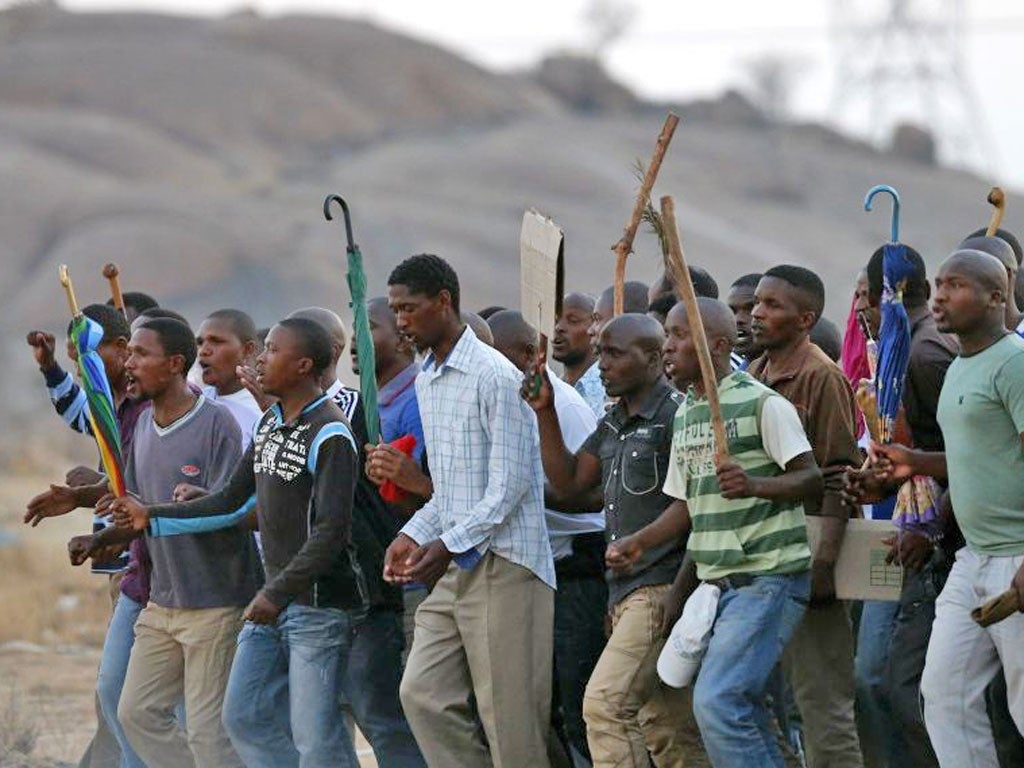They are all against us. It's apartheid
For the families of the Marikana mine shooting victims, it seems the bad old days are back. By Alex Duval Smith in Marikana

Your support helps us to tell the story
From reproductive rights to climate change to Big Tech, The Independent is on the ground when the story is developing. Whether it's investigating the financials of Elon Musk's pro-Trump PAC or producing our latest documentary, 'The A Word', which shines a light on the American women fighting for reproductive rights, we know how important it is to parse out the facts from the messaging.
At such a critical moment in US history, we need reporters on the ground. Your donation allows us to keep sending journalists to speak to both sides of the story.
The Independent is trusted by Americans across the entire political spectrum. And unlike many other quality news outlets, we choose not to lock Americans out of our reporting and analysis with paywalls. We believe quality journalism should be available to everyone, paid for by those who can afford it.
Your support makes all the difference.At the age of 22, Katiso Mosebetsane is too young to remember apartheid in South Africa. But he says the past week has taught him what it must have been like. "You have the employer, the government, the police and even the trade union working together. They are supposed to look after you but they are against the people – that's apartheid.''
Mr Mosebetsane has come to Marikana with his aunt, Anna, and sister, Veronica, from the rural Eastern Cape. After the killing by police on 16 August of 34 striking miners, the family of 49-year-old winch operator Thabiso tried desperately to reach him on his mobile phone. After four days of calling in vain, they made the 620-mile journey. Now they sit in their migrant breadwinner's tidy shack. "In the end, I found him in a morgue," said Katiso, adding: "Now we need to take his body back to our village."
The head-on view from Thabiso's shack is of a parched, litter-strewn field beneath Lonmin's giant processing plant. South Africa's platinum belt, that holds 80 per cent of the world's known stocks of the metal, has been disfigured by 40 years of mining.
Platinum's main use is in catalytic converters, to clean the exhaust fumes of cars. But cleanliness, let alone prettiness or quality of life, never seems to have been on the agenda for the 25,000 men who travel from all over southern Africa to mine it here.
The municipality has clearly decided that picking up litter around the shacks is Lonmin's job. Lonmin apparently sees the shacks as overflow housing, so it's just not done.
Like no other event since majority rule, the Marikana killings threw into sharp focus the fragile relationship established at the end of apartheid in 1994 between government, employers, trade unions, law enforcers, the justice system and ordinary people. Yesterday those parties were sitting in the Lonmin offices in a bid to achieve a handshake as a prelude to possible wage talks. Outside, on the grass, a couple of hundred miners waited for news.
But it is very difficult to imagine any of these men going back to work any time soon. The only news that reached them yesterday were reports that police had opened fire with rubber bullets on gold miners. The Marikana miners want 12,500 Rand (£933) a month – a three-fold increase for some – and "if we don't get it the mine can close", said a miner from Mozambique.
Forty-four people died here last month; 34 on August 16 and a further 10 – including two police officers and two security guards – in the six strike days leading up to the disastrous police operation. On top of that, 78 men have been injured and 270 arrested, though about half were released yesterday after the prosecution dropped controversial murder charges.
The government appointed an inter-ministerial committee, briefed to help the families of the dead and injured, issue death certificates, arrange counselling and help arrange and pay for funerals.
But Thabiso Mosebetsane's family has not felt supported by them. "There is an office over there at Lonmin," said Katiso. "They say they will send the body to the Eastern Cape and that the funeral will happen next Saturday. But we have many questions. Those people do not take time to explain. They treat us like we are inconvenient to them."
His view sums up much of South Africa's view of the country's establishment in the wake of Marikana. The African National Congress government's credentials to govern have been sliding. Nationally, the ANC's governing alliance is perceived as being too cosy with the white-led corporations they opposed during apartheid.
President Zuma has indicated he would like to stay on when the ANC holds leadership elections in December. The judicial inquiry he has commissioned into the killings at Marikana is not due to report until the end of January. But that may not save him.
The three-minute blast of gunfire at Marikana on 16 August has the potential to be the event that sparks South Africa's long-talked-about "second transition": the point at which the country reappraises the compromises and deals that were struck to secure the peaceful passage from apartheid to majority rule in 1994.
Join our commenting forum
Join thought-provoking conversations, follow other Independent readers and see their replies
Comments